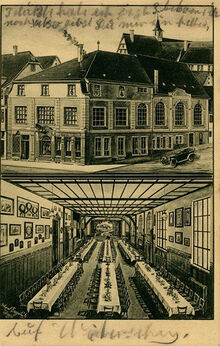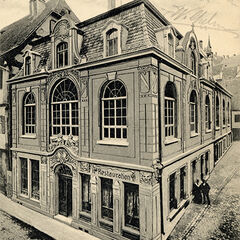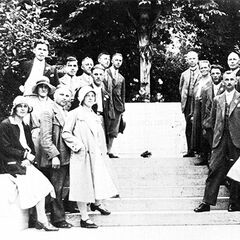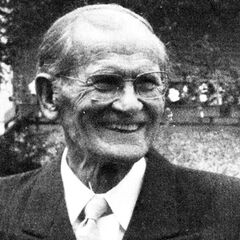Löwen Hall: Meeting Place of Tübingen's Labor Movement
Station im Stadtrundgang: History Path to National Socialism
Workers, craftsmen, and winegrowers made up the majority of residents in the Unterstadt (lower part of Tübingen's old town). During the 1920s, they were organized in numerous trade unions and voted mostly for leftist or left-wing liberal parties. The large hall in the Löwen (Lion) inn was a popular meeting place of Tübingen's labor movement. Even on February 12, 1933 (the Nazis had seized power on January 30), Social Democrats and Communists congregated here for a protest meeting—but this collective action by the divided German left came too late.
There were much fewer blue-collar workers in Tübingen than in Reutlingen or Stuttgart. Still, there was a complex labor movement in town until 1933: the Sozialdemokratische Partei Deutschlands (Social Democratic Party of Germany, SPD) and the Kommunistische Partei Deutschlands (Communist Party of Germany, KPD), the Freie Gewerkschaften (Free Trade Unions), the Arbeiterturnerbund (Workers' Gymnastics Federation), Arbeitergesangvereine (workers' glee clubs), or the Naturfreunde ("Friends of Nature") hiker's club. At a time when "academic" Tübingen was already predominantly voting for the Nationalsozialistische Deutsche Arbeiterpartei (National Socialist German Workers' Party, NSDAP) and other German nationalist parties, the Unterstadt still preferred the left: the last free elections in November 1932 saw the KPD and SPD receive more votes than the NSDAP and the Deutschnationale Volkspartei (National German People's Party, DNVP) together. In all of Tübingen, though, the parties of the political left received only a fifth of the total vote.
After the "Ermächtigungsgesetz" (Enabling Act) of March 1933, all labor movement organizations were gradually persecuted and outlawed. 27 Communists and Social Democrats from Tübingen as well 15 from Lustnau and 10 from Hagelloch were temporarily put into concentration camps. After this, only a few of them dared to openly oppose the National Socialist regime. Others changed their political views and adjusted themselves to the "Volksgemeinschaft" ("people's community"). Yet another group stuck with its attitude but did not utter it publicly; they met for seemingly apolitical hikes or in a winegrower's shed outside Tübingen.
There is evidence of the activities of small resistance groups at least until 1937. One of them met in a cellar in Hohentwielgasse street, collected money for persecuted comrades, distributed illegal writings, and obtained fake passports for enemies of the National Socialist regime. Just after the end of the war in May 1945, this circle provided members for the "Demokratische Vereinigung" ("Democratic Union") that prepared the new political beginning in Tübingen.
Image 1 and 2
The large hall in the Löwen (Lion) inn served as a venue for the festivities of Arbeitervereine (workers' associations) and for political rallies of the leftist parties. It was here that Communist physician and writer Friedrich Wolf talked about the question of abortion and where Social Democrat Reichtstag (German Reich parliament) member Fritz Ulrich warned of fascism. Images: City Archives Tübingen
Image 3
In the spring of 1933, trade union members from Tübingen went on a trip to the Heidelberg grave of the late Reichspräsident (German Reich President) Friedrich Ebert (1871-1925) of the Sozialdemokratische Partei Deutschlands (Social Democratic Party of Germany, SPD). They wanted to show that they were still standing by the republic and Social Democracy. Photo: private
Image 4
Heinrich Kost (1899-1979) was chairman of Tübingen's trade unions until May 1933. He was able to save their meeting minutes, which today serve as a valuable historical source. Kost worked as a printer at the Tübinger Chronik, the local newspaper. When a National Socialist was appointed head of the newspaper's works council in the fall of 1933, Kost wrote a letter of protest. Photo: private





